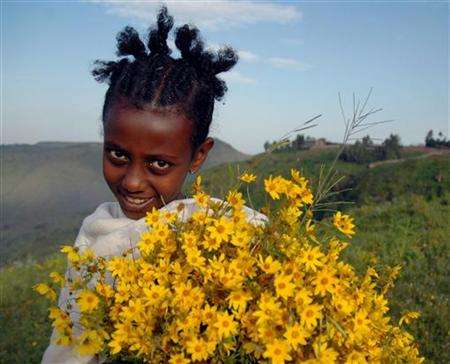
Melkam Addis Amet!
That’s "Happy New Year" in Amharic, the language of Ethiopia. Ethiopians are celebrating their New Year, or Enkukatash, today. It’s an important day in the Ethiopian culture, as the New Year’s festival also symbolizes the beginning of good harvest weather following the rainy months. The beautiful yellow Meskel daisies that are a symbol of the celebration can be seen blooming in the highlands, turning the hillsides to gold.
Ethiopia still follows the Julian calendar, established in 25 BC. The Julian calendar divides a year into 12 months of 30 days plus an extra month, Pagume, which is five or six days long depending on the year. The Julian calendar is seven years behind the Gregorian calendar used by most of the Western world, so when you see references in Ethiopia to 2008, you’re actually up to date!
The New Year’s celebration includes religious observances, a traditional meal of injera and wat (essentially bread and stew), and girls exchanging bouquets of daisies and singing songs. You can learn more about the customs of Enkutatash here … there’s even a recipe for doro wat, or chicken stew.
We wish all of our Ethiopian friends blessings in the new year!

Melkam Addis Amet!
That’s "Happy New Year" in Amharic, the language of Ethiopia. Ethiopians are celebrating their New Year, or Enkukatash, today. It’s an important day in the Ethiopian culture, as the New Year’s festival also symbolizes the beginning of good harvest weather following the rainy months. The beautiful yellow Meskel daisies that are a symbol of the celebration can be seen blooming in the highlands, turning the hillsides to gold.
Ethiopia still follows the Julian calendar, established in 25 BC. The Julian calendar divides a year into 12 months of 30 days plus an extra month, Pagume, which is five or six days long depending on the year. The Julian calendar is seven years behind the Gregorian calendar used by most of the Western world, so when you see references in Ethiopia to 2008, you’re actually up to date!
The New Year’s celebration includes religious observances, a traditional meal of injera and wat (essentially bread and stew), and girls exchanging bouquets of daisies and singing songs. You can learn more about the customs of Enkutatash here … there’s even a recipe for doro wat, or chicken stew.
We wish all of our Ethiopian friends blessings in the new year!

About The Author: Water to Thrive
More posts by Water to Thrive